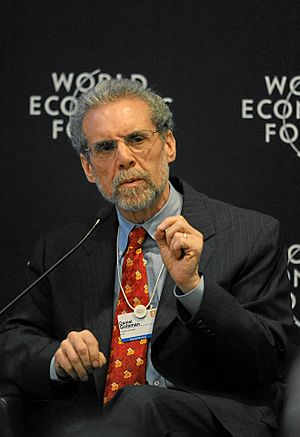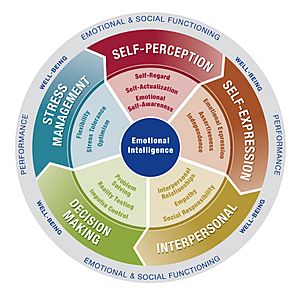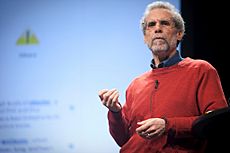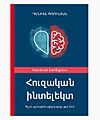Daniel Goleman facts for kids
Quick facts for kids
Daniel Goleman
|
|
|---|---|

Goleman at the 2011 WEF
|
|
| Born | March 7, 1946 Stockton, California, U.S. |
| Occupation |
|
| Education | Amherst College (BA) Harvard University (PhD) |
| Spouse | Tara Bennett-Goleman |
Daniel Goleman (born March 7, 1946) is an American psychologist, author, and science journalist. For twelve years, he wrote for the famous newspaper The New York Times. He wrote articles about how the brain works and why people act the way they do.
Goleman is best known for his 1995 book, Emotional Intelligence. This book was a huge success. It was on The New York Times Best Seller list for over a year. It has been sold in many countries and translated into 40 different languages. Besides emotional intelligence, Goleman has written about many other topics. These include creativity, meditation, and learning how to get along with others.
Contents
Life and Education
Daniel Goleman was born in Stockton, California. His mother was a professor of sociology, and his father was a professor of humanities.
Goleman was a very good student. He went to Amherst College and later earned a Ph.D. in psychology from Harvard University. A Ph.D. is one of the highest degrees a person can get from a university.
After his studies at Harvard, Goleman traveled to India. There, he learned about meditation from a spiritual teacher named Neem Karoli Baba. This trip inspired him to write his first book. When he returned to the U.S., he taught a popular class about the psychology of consciousness at Harvard. Soon after, he began his career as a writer for magazines and newspapers.
Career and Main Ideas
For many years, Goleman worked as a science journalist for The New York Times. He wrote about psychology and the brain. His work was so good that he was nominated for the Pulitzer Prize, a very important award for writers.
What is Emotional Intelligence?
Goleman became famous for his ideas about emotional intelligence. Emotional intelligence (often called EQ) is about how well we understand and manage our feelings and the feelings of others. It's not the same as IQ, which measures how well you do in school subjects like math or science.
According to Goleman, emotional intelligence has a few key parts:
- Self-awareness: Knowing your own emotions and how they affect your thoughts and actions.
- Self-management: Being able to control your feelings and behaviors.
- Empathy: Understanding and sharing the feelings of other people.
- Social skills: Being good at building relationships and communicating with others.
Goleman argued that having high emotional intelligence can be just as important as having a high IQ for being successful in life and at work. His book Emotional Intelligence was named by TIME magazine as one of the most important business books ever written.
Focus and Mindfulness
In another popular book, Focus: The Hidden Driver of Excellence, Goleman wrote about the importance of paying attention. He said that being able to focus is a key to success. He described three types of focus:
- Inner focus: Paying attention to your own thoughts and feelings.
- Other focus: Paying attention to other people, which helps with empathy.
- Outer focus: Paying attention to the world around you.
Goleman believes that practicing mindfulness and meditation can help people improve their focus. He says this is especially important for leaders, who need to guide the attention of their teams.
Helping Students Learn
In 1993, Goleman helped start an organization at Yale University called the Collaborative for Academic, Social, and Emotional Learning (CASEL). The goal of CASEL is to teach students social and emotional skills in school. This type of learning, called SEL, helps kids understand their emotions, set goals, show empathy, and make good decisions.
Awards and Recognition
Goleman has received many awards for his work in explaining science to the public.
- In 1984, he won a Career Achievement award from the American Psychological Association.
- He was named a Fellow of the American Association for the Advancement of Science.
- He received the Washburn Award for Science Journalism in 1997.
- In 2023, he received the Centennial Medal from the Harvard Griffin Graduate School of Arts and Sciences.
See also
 In Spanish: Daniel Goleman para niños
In Spanish: Daniel Goleman para niños
- Emotional aperture
Images for kids
 | William Lucy |
 | Charles Hayes |
 | Cleveland Robinson |




